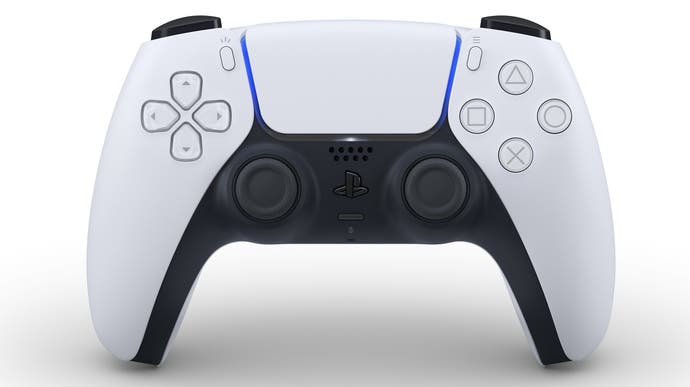PS5 DualSense controller design, features, haptic feedback, adaptive triggers and more explained
All the details we currently know about the new PS5 controller.
The PS5 or, to use its full title, the PlayStation 5 will be arriving around Christmas 2020 and with it comes a new PS5 controller.
Breaking tradition, the PS5 controller is called the DualSense and, when compared to past Playstation controllers, has quite a unique look.
Like the PS5 specs, PS5 SSD storage, PS5 console design, upcoming PS5 games and the backwards compatibility of the PS5, on this page you'll find everything we know about the upcoming PS5 controller - the DualSense.
On this page:
- Create button, adaptive triggers and other confirmed PS5 DualSense controller design features explained
- DualSense Wireless Controller Specifications: Every spec for the PS5 DualSense controller
- Haptic feedback and the PS5 DualSense controller explained
- Other things we do - and don't know - about the PS5 DualSense controller
Create button, adaptive triggers and other confirmed PS5 DualSense controller design features explained
We first learned about the features of the upcoming PS5 controller from an interview Mark Cerny gave with Wired and later got our first look at the DualSense from a PlayStation blog post announcing the new controller.
Thanks to that blog post and the Cerny interview, we know that the controller will have the following features:
- A completely reworked design for a PlayStation controller, which includes two colours - black and white. It definitely doesn't look like a leftover prop from a budget science-fiction movie.
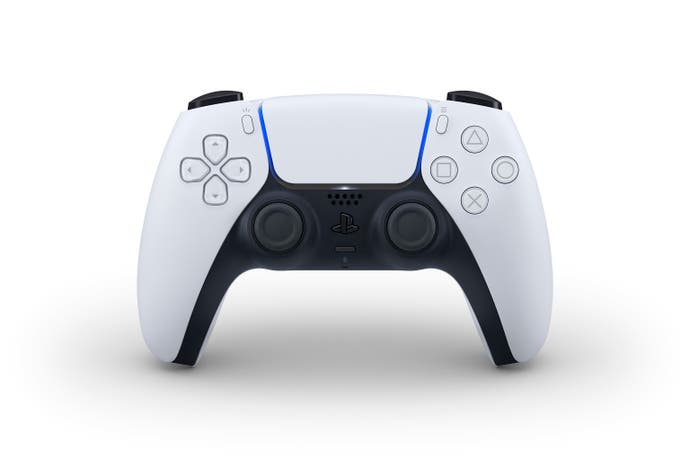
- Adaptive triggers in the L2 and R2 buttons will offer levels of resistance while gaming. Examples of this in action include the tension when pulling a bow string before firing an arrow and being able to differentiate between the feel of a machine gun and a shotgun. In Arkane's Deathloop, it will block the trigger when your weapon jams.
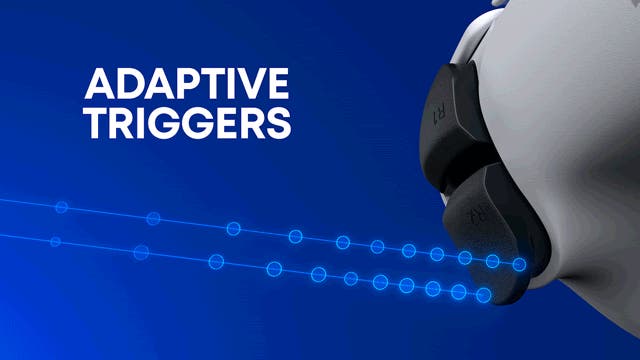
- The angle of the triggers has been changed, alongside minor upgrades to the grip.
- Improved haptic feedback, i.e. improved rumble, will offer "astonishing effects" according to Wired, allowing you to feel the effects of different surfaces, whether it's resistance or simply a "bouncy sensation."
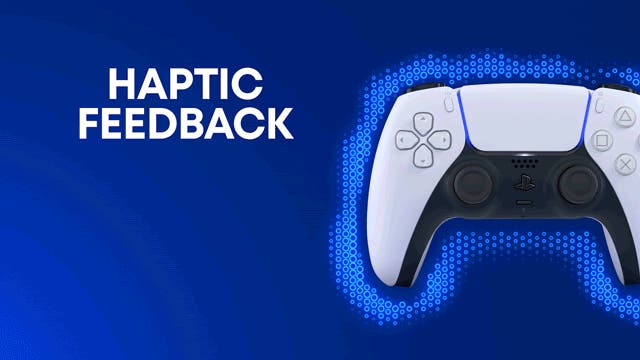
- The 'Create' button replaces the 'Share' button. The Create button will pioneer "new ways for players to create epic gameplay content to share with the world, or just to enjoy for themselves."
- A built-in microphone array, though you will still be able to use a headset if you prefer. There is also a mute button for the in-built microphone on the DualSense controller.
- It will have a USB Type-C port, which is used on modern (Android) smartphones, the Nintendo Switch and the Xbox Series X controller. The inclusion of this port was previously confirmed during Mike Cerny's interview with Wired.
- It's heavier than the DualShock 4, thanks to the inclusion of haptics and a higher capacity battery, which doesn't necessarily mean a longer battery life - it could be there to support the new, more intensive, features. Though, thanks to the Wired, we know that according to product manager Toshi Aoki, it should be lighter than the current Xbox controller "with batteries in it."
- A larger form factor than the DualShock 4, as shown here in this tweet by Geoff Keighley:
- A textured grip on the underneath of the DualSense is also part of this new controller design.
- The PS button is now shaped like the PlayStation logo, rather than simply being a round button with the logo on it.
- Retains a rechargeable battery, internal speaker, touchpad and lightbar, with the lightbar now located either side of the touch pad.
DualSense Wireless Controller Specifications: Every spec for the PS5 DualSense controller
After the PlayStation 5 Showcase on the Wednesday 16th September, the specification for the DualSense Wireless Controller were released. These specs will tell you everything you need to know about the mechanisms for the controller, including it's weight and dimensions.
Below you can find the specifications for the PS5 DualSense controller, which were copied verbatim from the press release announcing the launch of the PS5:
| Specification | |
|---|---|
| Dimensions | 160mm x 66mm x 106mm (width x height x depth) |
| Weight | 280g |
| Buttons | PS button Create button Options button Directional buttons (Up, Down, Left, Right) Action buttons (Triangle, Circle, Cross, Square) R1 / L1 button R2 / L2 button (with Trigger Effect) Left Stick / L3 button Right Stick / R3 button Touch Pad button MUTE button |
| Touch Pad | 2 Point Touch Pad Capacitive Type Click Mechanism |
| Motion Senor | Six-axis motion sensing system (three-axis gyroscope + three axis acceleormeter) |
| Audio | Built-in Microphone Array Built-in Mono Speaker Stereo Headset Jack - Output: 48Hz/16bit and Input: 24kHz/16Bit |
| Feedback | Trigger Effect (on R2/L2 button) Vibration (haptic feedback by dual actuators) Indicators (Light bar / Player Indicator / MUTE status) |
| Ports | USB Type-C port (Hi-Speed USB) Stereo Headset Jack Charging Terminals |
| Communication | Wireless - Bluetooth Ver 5.1 Wired - USB connection (HID, Audio) |
| Battery | Type - Built-in rechargeable lithium-ion battery Voltage - DC 3.65V Capacity - 1,560mAh |
Haptic feedback and the PS5 DualSense controller explained
Haptic feedback is when a game using touch to convey an event or activity to player.
Typically this achieved through the controller's rumble settings, such as having the controller shake when an object explodes, so, when discussing haptic feedback, we're often talking about how developers improve the controller's rumble settings, much like the HD rumble for the Nintendo Switch.
When creating the DualSense controller Sony developers focused on improving the haptic feedback, because, as Sony explains in the blog post announcing the DualSense, "We had a great opportunity with PS5 to innovate by offering game creators the ability to explore how they can heighten that feeling of immersion through our new controller."
In the Mark Cerny interview with Wired, we learnt that the improved haptic feedback was achieved through the use of "highly programmable voice-coil actuators located in the left and right grips of the controller."

Wired were also given the opportunity to play a version of Gran Turismo Sport on the PS5 dev-kit, which allowed them to experience the improved haptic feedback, which they described as "Driving on the border between the track and the dirt, I could feel both surfaces."
This sensation, Wired explains, "disappeared entirely" when they replayed the same track using the DualShock 4, which emphasises exactly how much the haptic feedback has been improved in the DualSense.

The improved haptic feedback the DualSense brings the player will then work if other important features of the new controller, such as the speaker and adaptive triggers, to increase immersion for the player.
With the PlayStation 5 on its way, we’ve written guides on everything we currently know about PS5 specs, PS5 Digital Edition vs regular PS5 differences, PS5 SSD storage, PS5 console design, PS5 downloads, the backwards compatibility of the PS5, the PS5 controller, the PS Plus Collection and upcoming PS5 games you’ll be able to play. You can also check the latest PS5 stock info. Until then, for existing PS4 owners, find out the PlayStation Plus games for this month.
Other things we do - and don't know - about the PS5 DualSense controller
Although we now have a clearer idea about what to expect from the DualSense, here are other tidbits you should know about:
- With DualShock 4 not compatible with PS5 games, you will need to own multiple DualSense controllers to play local multiplayer.
- On that note - we still don't know how much are will a standalone DualSense controller set you back. This information will, presumably, be released alongside the official price for the PlayStation 5.
- While we now know what the DualSense looks like, we don't know whether it will come in a variety of colours. The use of two colours does allow the DualSense to to have a wider variety of designs compared to previous PlayStation controllers, so it will be interesting to see if Sony takes advantage of this.
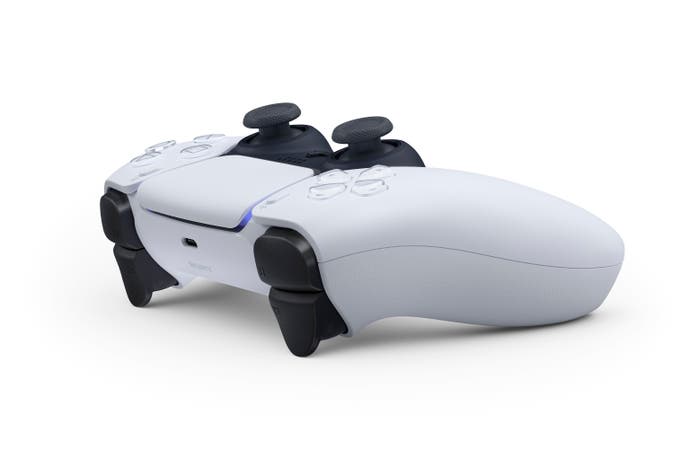
- The exact battery life for the DualSense is also important information that is still a mystery to us. The DualShock 4 has a battery life of roughly four to eight hours, depending on how you use it. Considering the new features included in the DualSense, it will be interesting to see how its battery life compares to the DualShock 4.
- We're still waiting to hear about what exactly what the new 'Create' button is capable of. It does sound like it will share many of the same features as the DualShock 4's 'Share' button, allowing you to take screenshots for example, but it will be interesting to see whether, or how, these functions have been expanded on.
If you want to know more about the PS5, then check out our pages on the PS5 specs and upcoming PS5 games.
